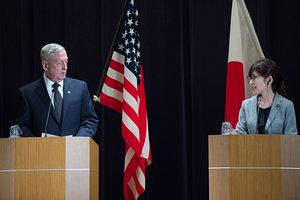The United States and Japan will host their first so-called ‘two-plus-two’ meeting since U.S. President Donald J. Trump’s inauguration in January, a Japanese government source has told Kyodo news agency.
‘Two-plus-two’ talks refer to high-level strategic talks incorporating the top defense and diplomatic officials from both sides; in this case, that would include U.S. Defense Secretary Jim Mattis, U.S. Secretary of State Rex Tillerson, Japanese Defense Minister Tomomi Inada, and Japanese Foreign Minister Fumio Kishida.
The dialogue is likely to be held in the United States in late April.
The path to a ‘two-plus-two’ meeting has been set by several high-level interactions between the two allies since Trump’s inauguration.
First, U.S. Secretary of Defense visited Tokyo to reaffirm the United States’ enduring backing of the alliance. Days later, Japanese Prime Minister Shinzo Abe became the second world leader to be received by Trump at the White House.
Rex Tillerson visited Japan earlier this month, with a visit that focused heavily on North Korea, which had carried out multiple missile launches and showed off a high-thrust rocket engine since Mattis’ initial trip.
Indeed, per Kyodo, the 2+2 talks will focus heavily on the question of North Korea, with the Japanese side expecting to push for an expansion in Japan’s ballistic missile defense capability.
Japan already has sea-based Aegis guided missile destroyers equipped with Standard Missile-3 interceptors and land-based Patriot Advanced Capability 3 (PAC-3) batteries.
Tokyo is mulling the introduction of a Terminal High Altitude Area Defense (THAAD) battery and an Aegis Ashore installation.
Since the beginning of 2016, North Korea has carried out 30 ballistic missile tests, including the most recent failed test out of Wonsan last week. In 2016 alone, North Korea tested 24 ballistic missiles and carried out two nuclear tests.
Also in 2016, for the first time ever, a North Korean Nodong missile splashed down in Japan’s exclusive economic zone after a test. North Korea’s earlier launch of a four-missile salvo of extended range Scud missiles earlier this month also resulted in three missiles splashing down in Japan’s EEZ.
Japan is increasingly treating the threat from a North Korean ballistic missile attack as an imminent threat. Earlier this month, the country staged its first-ever civilian evacuation drill under a simulated North Korean attack.
Tokyo has also considered instructing its armed forces to maintain missile defense readiness under an open-ended intercept order to shoot down any North Korean projectiles being tested in the Sea of Japan.
Generally, the United States, Japan, and South Korea gain valuable insight into North Korea’s capabilities by gathering data on tests so the three states haven’t yet tried to intercept North Korean ballistic missile flight testing.
The three states have, however, sharply increased their trilateral cooperation on intelligence sharing and ballistic missile defense with regard to North Korea in recent years.

































